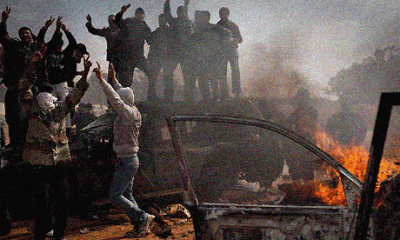 As Western intervention against the Qaddhafi regime enters its seventh day, rebels remain enthusiastic. The Arab League, though considerably less enthusiastic, also continues to back the effort. In the United States, however, some commentators have adopted a more critical approach.
As Western intervention against the Qaddhafi regime enters its seventh day, rebels remain enthusiastic. The Arab League, though considerably less enthusiastic, also continues to back the effort. In the United States, however, some commentators have adopted a more critical approach.
One such figure is Glenn Greenwald, who stands out as perhaps the most principled and scathing media critic with a sizeable audience. In a blog post yesterday, titled, “The manipulative pro-war argument in Libya,” Greenwald takes the New Republic’s John Judis to task for asserting that opponents of intervention are indifferent to the rebels’ plight:
[D]o you support military intervention to protect protesters in Yemen, Bahrain, Saudi Arabia and other U.S. allies from suppression?… Did you advocate military intervention to protect protesters in Iran and Egypt, or to stop the Israeli slaughter of hundreds of trapped innocent civilians in Gaza and Lebanon or its brutal and growing occupation of the West Bank?
Greenwald then delivers the blow: “If not, doesn’t that necessarily mean — using [your own] reasoning — that you’re indifferent to the suffering of all of those people…?”
This rebuttal smartly stands Judis’ logic on its head: those favoring military action in Libya cannot blithely assume that opponents neglect the plight of others when, in truth, most people on both sides of the argument reject military action elsewhere in the world — not out of callousness — but over concern about the consequences of more violence.
The problem, however, is that many bloggers and writers — including one approvingly linked by Greenwald — now brandish this line as an all-purpose rationale for opposing action. “If you do not support military intervention against so-and-so,” goes the argument, “then you are a hypocrite for supporting intervention in Libya; therefore, it is wrong.”
This line of reasoning suffers from at least three logical fallacies.
1. Avoiding The Issue
A failure to solve all the world’s ills does not justify a failure to address one particular ill.
On more than one occasion, defenders of Israeli occupation have pointed to injustices committed by Arab rulers, a deflection which, in their minds, somehow mitigates the brutality of Israeli colonialism. And by the same logic, defenders of apartheid in South Africa could point to atrocities in other parts of Africa to argue that no one should oppose white supremacy until all the continent’s other problems were fixed first.
This paralyzing notion — you should do nothing until you do everything — could be applied to most any situation, and with equally ridiculous results.
In short, pointing to a failure to intervene militarily in crises around the world says nothing about the pros and cons of helping Libyan rebels.
2. A False Equivalency
While it is illogical to make support for military intervention in Bahrain, Saudi Arabia, or Israel a precondition for helping Libyan rebels, it is wrong to posit that intervention in those countries would be equivalent to the mission in Libya in the first place.
In the case of America’s allies, the administration could likely stop the bloodshed by ending its military, diplomatic, and political cover for the oppressive regimes. That would place serious pressure on rulers who depend on American enablement and impede their ability to inflict violence on their victims.
With Qaddhafi, those levers of influence are absent.
3. Consistent Immorality is No Virtue; Inconsistent Morality is a Lesser Vice
The heart of the popular anti-interventionist argument — “you are a hypocrite” — is a moral one: but it is a heart that does not beat.
For while it is deplorable that policymakers apply their moral outrage selectively (in accordance with perceived national interests), that does not mean we should abandon the moral impulse altogether for the sake of consistency.
Consider, for instance, a scenario where ten innocent men are lined up to be shot. A bystander intervenes and saves the life of one or two men, but, for whatever selfish reason, leaves the rest to die. Now consider a parallel scenario, wherein the only difference is that the bystander does absolutely nothing and leaves all ten men to their demise.
Which is the better choice: consistency or hypocrisy?
Some arguments against intervention deserve serious consideration. The “hypocrisy” mantra, however, is not one of them.
M. Junaid Levesque-Alam blogs on Islam and America at his website, Crossing the Crescent.
